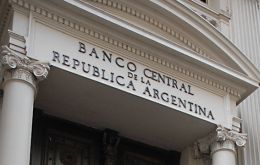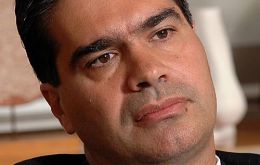MercoPress. South Atlantic News Agency
Tag: Buenos Aires Stock Exchange
-
Tuesday, August 15th 2017 - 23:49 UTC
Argentine stocks and the Peso strengthen following Sunday primary results

Argentine stocks rose, the peso strengthened more than 3% and credit default swaps fell on Monday after the mid-term legislative primary election was seen as favoring business-friendly President Mauricio Macri's reform effort.
-
Saturday, November 12th 2016 - 21:24 UTC
Trump wave keeps Merval on the fall for a total 9.25% drop in a week

The index of the leading shares of the Buenos Aires stock market returned to adjust results in 3.51% and accumulated thus four rounds of losses for a total drop of 9,25% sice Monday. The Merval started the week with 17,257.56 points and dropped Friday to 15,659.74 points, with significant decreases except for Tenaris, which managed to stay away from the trend of US-based businesses thanks to a positive balancesheet produced last week.
-
Saturday, May 7th 2016 - 06:20 UTC
Lord Price said UK and Argentina at the start of a new era of bilateral relations

British Trade and Investment Minister, Lord Price said that Argentina and the UK are at the beginning of a new era in bilateral relations and in an excellent position to turn common interests into concrete business interests. Lord Price together with a mission of UK top business leaders ended on Friday a two-day visit to Argentina, the first in ten years.
-
Saturday, April 30th 2016 - 11:45 UTC
YPF will fight back legal claim seeking US$ 500 million for rescinding contracts

Argentina's state-run energy company YPF said this week it will fight a legal claim seek more than US$500 million in damages for rescinding natural gas export contracts in 2009. “YPF shall use all its legal resources to defend its interests and those of its shareholders,” the company said in a filing with the Buenos Aires Stock Exchange.
-
Tuesday, October 27th 2015 - 07:04 UTC
Argentina's markets trade higher the 'day after' Sunday's elections

Argentina's financial markets traded higher on Monday after opposition and pro market candidate Mauricio Macri's surprisingly strong showing in presidential elections forced as second vote on 22 November.
-
Wednesday, November 21st 2012 - 21:18 UTC
Another Argentine province confirms ‘pesification’ of dollar-denominated bonds

Another Argentine province, Formosa announced that it would be repaying in Pesos its dollar-denominated bonds (FORM3) issued under local law, at an exchange rate of 4.81 Pesos per dollar.
-
Tuesday, November 6th 2012 - 06:38 UTC
Venezuelan leader establishes similarities between the governments of Argentina and Venezuela

Henrique Capriles, the runner-up in Venezuela’s recent presidential elections, commented on comparisons between Argentina’s and Venezuela’s governments in an article published on Sunday in an Argentine provincial newspaper.
-
Thursday, October 11th 2012 - 04:45 UTC
Argentine central bank confirms no restrictions for governments to purchase dollars

The Argentine central bank confirmed on Wednesday that there is no money exchange restrictions for the federal government or provinces to purchase US dollars to honour public debt issued offshore.
-
Wednesday, October 10th 2012 - 08:13 UTC
Foreign exchange clamp forces Argentine province to pay dollar bonds in pesos

The foreign exchange clamp in Argentina is reaching the provinces, one of which at least was unable to honor maturing bonds in dollars and made the payment in Argentine Pesos.
-
Friday, August 3rd 2012 - 08:36 UTC
CFK defends Argentina’s economic model and capacity to honour debts

While addressing the nation from the Buenos Aires stock exchange floor, Argentine President Cristina Fernández strongly defended the policy of drastically cutting debts, which guarantees “greater independence”, and of stimulating the economy because only with resources can debts be paid, “the dead don’t pay debts”.
